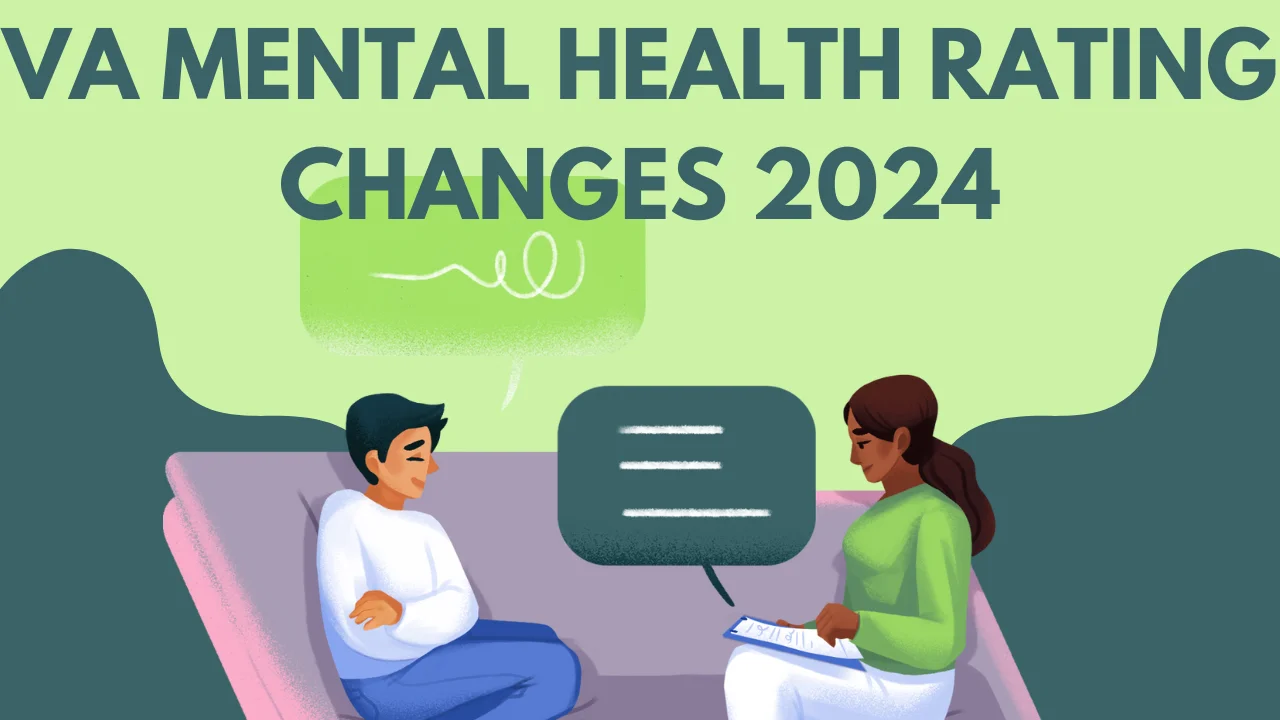VA Mental Health Rating Changes 2024: What Veterans Need to Know
The VA mental health rating changes 2024 bring significant updates designed to provide a fairer assessment of veterans’ mental health. These changes focus on how mental health issues impact veterans’ daily lives rather than relying solely on symptom severity. The new system centers on evaluating real-life impacts across different functional areas, aiming to better represent the challenges veterans face. Let’s explore the upcoming changes, what they mean, and how they may affect veterans’ disability ratings.
Introduction to VA Mental Health Rating Changes 2024
The VA mental health rating changes 2024 mark a transformative step in how the Department of Veterans Affairs (VA) evaluates and compensates veterans dealing with mental health conditions. These changes aim to improve the fairness and accuracy of disability ratings. Moving away from a symptom-only approach to one that considers real-world functional impacts. For many veterans, mental health challenges impact daily activities, relationships, work abilities, and overall quality of life in ways that symptoms alone might not fully capture. The new system introduces a framework that assesses five key functional domain. Cognition, interpersonal relationships, task completion, environmental navigation, and self-care—providing a more holistic view of each veteran’s experience. By focusing on these domains, the VA seeks to ensure that compensation levels reflect the true extent of the limitations veterans face due to their mental health conditions. These updates are not only designed to improve the lives of veterans by acknowledging their unique challenges. But also align with modern medical insights into mental health, making the rating process more compassionate and tailored.
Understanding the Five Functional Domains
One of the most critical shifts in the VA mental health rating changes 2024 is the addition of five functional domains. Instead of focusing only on symptoms. The VA will assess how mental health conditions affect veterans across different aspects of their daily lives. Each domain will be evaluated on a scale from 0 to 4, with 0 representing no impairment and 4 indicating total impairment. This approach offers a more detailed, personalized picture of each veteran’s experience.
The five functional domains are:
- Cognition: This measures a veteran’s mental abilities, including memory, focus, attention, and problem-solving skills. Difficulties in this area can significantly impact tasks requiring concentration and mental agility.
- Interpersonal Interactions and Relationships: Social and work-related relationships fall under this domain, examining how veterans interact with others. Struggles in forming and maintaining relationships can disrupt family life and make employment challenging.
- Task Completion and Life Activities: This domain assesses how mental health affects a veteran’s ability to complete daily tasks. Veterans who find it hard to manage household chores, take care of finances, or maintain a consistent schedule may receive higher ratings here.
- Navigating Environments: This focuses on a veteran’s ability to move and function in various settings. Veterans who experience anxiety or confusion in specific environments may need additional support.
- Self-Care: This measures a veteran’s capacity for personal hygiene and health maintenance. Veterans who struggle with self-care, whether from depression or other issues, might receive a higher impairment score.
Each domain receives a rating, and these combined ratings determine a veteran’s overall disability percentage. This change means the VA will take a broader look at how mental health conditions impact veterans across their daily lives.
Also Read: Ken Curtis Twin Brother: Exploring Fact and Fiction
Revised Rating Percentages for VA Mental Health in 2024
The VA mental health rating changes 2024 also involve updates to the rating percentages. Ratings are now assigned based on the level of impairment across the five domains, giving veterans more accurate compensation that reflects their real-life limitations. Below is a table that outlines how impairment levels correspond to disability ratings:
| Impairment Level | Corresponding Rating | Description |
|---|---|---|
| Level 4 (Total impairment) | 100% | Severe impact in one or more domains, indicating significant limitations in everyday activities. |
| Level 3 (Severe impairment) | 70% | Severe impairment in one domain or moderate impairment in multiple domains. |
| Level 2 (Moderate impairment) | 50% | Moderate impairment in at least one domain, indicating notable, but not incapacitating limitations. |
| Level 1 (Mild impairment) | 30% | Mild impairment in multiple domains, often allowing for some normal functioning with difficulty. |
| Level 0 (No impairment) | 10% | Minimum rating now, reflecting minor impacts on daily life but still qualifying for compensation. |
One of the most impactful updates in the VA mental health rating changes 2024 is the elimination of the 0% rating. Previously, some veterans with mild symptoms received no compensation, but now all diagnosed mental health conditions will receive a minimum rating of 10%. This ensures that even mild symptoms receive recognition and compensation, as they still impact veterans’ lives.
Also Read: The Most Interesting Man in the World Quotes: Wit, Wisdom, and Humor
Removal of Employment Restrictions for 100% Rating
In previous years, veterans seeking a 100% mental health disability rating had to demonstrate “total occupational and social impairment.” This rule meant that veterans who could work, even while experiencing severe mental health challenges, often received lower ratings. With the VA mental health rating changes 2024, the VA has removed this restriction. Veterans can now qualify for a 100% rating based solely on their mental health condition, regardless of their employment status. This update acknowledges that some veterans, though employed, still face significant challenges due to their mental health conditions. By removing this employment barrier, the VA aims to offer fair compensation for veterans who experience severe mental health issues but continue working.
Implementation Timeline and Impact on Existing Ratings
These updates are expected to take effect in the summer or fall of 2024. Once the changes are finalized, there will be a 60-day period before they become official. Veterans currently receiving compensation will not see their ratings decrease due to the VA mental health rating changes 2024. However, veterans who believe their condition warrants a higher rating under the new system may submit a claim for reevaluation. This proactive option allows veterans to pursue a more accurate rating, especially if the new criteria better capture the impact of their condition.
Also Read: Hilton Embassy Suites Breakfast Hours and Offerings
How VA Mental Health Rating Changes in 2024 Impact Veterans
The VA mental health rating changes in 2024 are part of a broader initiative to improve the disability rating system, making it more reflective of the challenges veterans face. By focusing on how mental health issues affect daily functioning, the VA acknowledges that each veteran’s experience is unique and that compensation should reflect real-life limitations.
For veterans, this approach offers an opportunity for a more individualized assessment. Veterans who might have previously received a low rating due to mild symptoms may now find that their real-world limitations receive more recognition. Veterans with severe impairments but who are employed can also receive fairer ratings, ensuring that their struggles are acknowledged.
These changes reflect the VA’s commitment to offering comprehensive support for veterans, recognizing that mental health conditions can impact life in diverse and profound ways. By aligning the system with modern medical insights, the VA aims to create a more compassionate and responsive disability rating framework.
Conclusion
The VA mental health rating changes in 2024 are a significant step toward improving how veterans with mental health conditions are evaluated and compensated. The new system’s focus on functionality, combined with the updated rating percentages and removal of employment restrictions, provides a more accurate reflection of veterans’ daily experiences. This shift acknowledges the complexity of mental health challenges, ensuring that veterans receive the support and recognition they deserve.
Also Read: Guide to Roblox Rizz Tips, Tricks, and How to Master It







